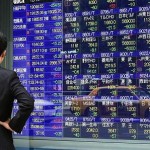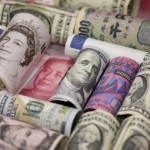Oil Advances With Asian Stocks While Bonds, Korean Won Decline

-
Bonds retreat after ECB says it will slow asset purchases
-
European index futures little changed at the start of trading
Oil rose a second day before a meeting between OPEC and other major producers on output cuts, as industrial metals gained. Asian stocks climbed toward their best week since September, while bonds and the Korean won declined.
U.S. crude traded near $51 a barrel before talks Saturday in Vienna between the Organization of Petroleum Exporting Countries and 14 other nations. Shares in Sydney and Tokyo climbed, while those in South Korea and Hong Kong slipped. European equity index futures were little changed at their start. Bonds from Australia to New Zealand fell after the European Central Bank pledged to cut debt purchases, while at the same time extending quantitative easing until the end of 2017. The won trimmed its biggest weekly advance in two months.

OPEC’s shock deal aimed at stabilizing oil prices will return to focus this weekend, with the meeting potentially giving investors clues as to whether the agreement will be fulfilled. While the ECB’s mixed message initially wrong-footed the market, it was eventually seen as a signal to buy equities as the extension of the current asset purchase program by three months was more than economists had expected. Attention now shifts to the Federal Reserve, with traders all but convinced the U.S. will end the year with an interest-rate hike.
“The immediate focus for the market is the discussions between OPEC and non-OPEC members this weekend,” said Jonathan Barratt, chief investment officer at Ayers Alliance Securities in Sydney. “The sweet spot for prices is around $55 a barrel. Anything higher and the market will see more supply.”
China’s factory-gate inflation rose to the highest since late 2011, helping to sustain prices around the world. Consumer prices picked up on rising food costs.
Commodities
- West Texas Intermediate crude futures climbed, extending Thursday’s 2.2 percent bounce and reducing oil’s retreat this week to 0.9 percent.
- Russia will fulfill its pledge to cut output by as much as 300,000 barrels a day if OPEC follows through on its commitment to curb production, according to a government official familiar with the matter.
- Representatives of countries including Mexico and Oman will meet with OPEC members in the Austrian capital.
- Gold for immediate delivery fell for a second session, declining 0.1 percent to $1,169.34 an ounce and heading for the worst run of weekly losses in more than a year.
Stocks
- About the same number of stocks rose as fell on the MSCI Asia Pacific Index, which climbed 0.1 percent as of 7:12 a.m. London time.
- Euro Stoxx 50 futures contracts were unchanged
- Japan’s Topix index added 0.8 percent, while the Nikkei 225 rallied 1.2 percent. Australia’s S&P/ASX 200 Index rose by 0.3 percent, capping a weekly jump of 2.1 percent.
- New Zealand’s S&P/NZX 50 Index fell 0.3 percent, with the Kospi index in Seoul down 0.3 percent.
- Hong Kong’s Hang Seng Index slumped 0.7 percent.
- S&P 500 Index futures were unchanged after the underlying measure climbed 0.2 percent to a new peak Thursday, swelling its post-election rally to more than 5 percent. The Dow Average added 65 points to a record 19,614.81, its seventh gain in eight days.
Currencies
- The yen, which typically moves at odds with Japanese stocks, fell another 0.4 percent to 114.44 per dollar, following a 0.2 percent pullback last session. It’s weakened 0.8 percent this week, set for its longest run of weekly losses in two years.
- The euro was little changed at $1.0615 following a 1.3 percent slump, which erased an initial surge of as much as 1.1 percent Thursday following the ECB’s statement.
- The won lost 0.6 percent, snapping a three-day rally.
- The Bloomberg Dollar Spot Index, which tracks the greenback against 10 major peers, was up 0.1 percent after gaining 0.5 percent on Thursday.
Bonds
- New Zealand government bonds due in a decade led losses in Asia, with yields rising 10 basis points, or 0.10 percentage points, to 3.29 percent.
- Yields on similar maturity notes in Australia climbed eight basis points to 2.82 percent.
- Ten-year Treasury yields advanced by another 1 basis point to 2.42 percent, after gaining seven basis points on Thursday following the ECB’s move.
Source: Bloomberg




























